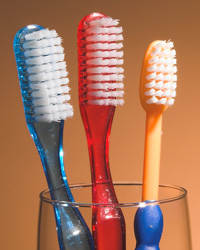Xylitol: Chew Your Way To Healthier Teeth and Gums?
Are you crazy about gum, but not so much about its affect on your teeth? (Good for you!) Researchers presenting at the American Academy of Pediatric Dentistry Annual Session in Cincinnati found a natural sweetener may not only improve the taste of gum, juice and candy, it may also reduce tooth decay and increase dental hygiene.
Their study observed children of Belize over the course of several years, some of whom chewed gum with sugar, others with artificial sweeteners. Results showed that those who chewed gum artificially sweetened with Xylitol, a natural sweetener found in trees and fruit that does not cause cavities, suffered from less tooth decay over the duration of the study.
Another study done in Finland found fewer mothers transmitted cavity-causing bacteria to their children when they chewed gum with xylitol. The bacteria transmission occurs when mother and children share eating utensils.
Xylitol is widely available in most supermarkets, but know that it's difficult to achieve the correct dosing. To see results, you'd have to chew gum with a high dose of Xylitol frequently and for prolonged durations. Products containing this natural sweetener may also cost more than those artificially sweetened with other additives.
So, the next time you're dying for a piece of chewy goodness, consider grabbing a brand containing Xylitol. While it can be difficult to obtain optimum results through its use, it is certainly better for your dental health to chew than gum containing sugar.

+Jim Du Molin is a leading Internet search expert helping individuals and families connect with the right dentist in their area. Visit his author page.
Self-Care Toothbrush Tips for Special Needs
Maintaining good oral hygiene can be a challenge, especially if you have developed a health condition that makes brushing and flossing more difficult, or have been in an accident that created new limitations. Dental professionals want to help all dental patients keep their mouths healthy, and they offer these suggestions about oral hygiene.
Dental Brushing Tips
Problems in hands, wrists, arms, and shoulders can hinder a person's ability to brush and floss. While each situation is different, there are some suggestions that have been effective in making dental care easier:
- Use a wide elastic band to attach the toothbrush to your hand for extra gripping power.
- Attach a small rubber ball, a sponge, or a rubber grip to the toothbrush handle with strong tape. This enhances gripping power and is often useful when hand or arm movement is weakened or limited.
- Use a longer wooden dowel, a ruler, or plastic rod to lengthen the toothbrush handle, wrapping it securely with strong tape. This longer length may help in more easily reaching your mouth.
- Use an electric or sonic toothbrush.
Dental Flossing Tips
If limitations make brushing and oral hygiene harder, flossing may be an even bigger challenge. Depending on your limitations, try these techniques:
- Use a piece of floss, about 18" long, and wind one end of floss around each finger instead of holding it. This will increase your grip and prevent the floss from dropping out of your fingers with each tooth you floss.
- Hold the floss tightly and seesaw it back and forth between the teeth, instead of pushing the floss right through.
- Tie the floss into a long circle instead of using one long piece, which may make it easier to hold and less likely to drop from your hands.
- Try using a floss holder, available wherever oral hygiene products are sold.
By Danine M. Fresch, DDS

+Jim Du Molin is a leading Internet search expert helping individuals and families connect with the right dentist in their area. Visit his author page.










